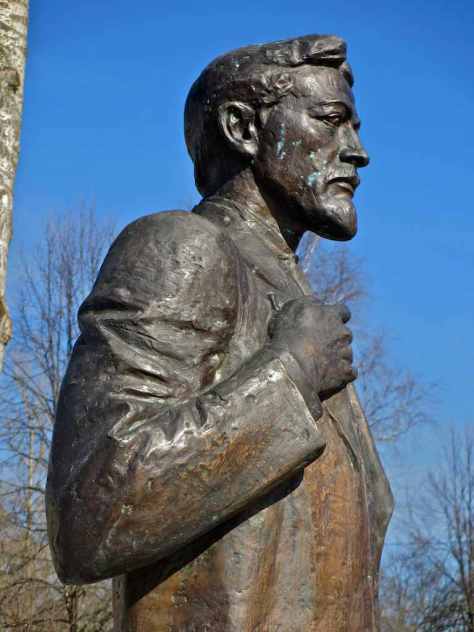Click on photos to enlarge.
Sergei Gandlevsky (born 1952) is one of the most respected Russian poets of our time. He is often mentioned together with Dmitry Prigov (1940-2007) and Lev Rubinstein (born 1947), although that may just be internet laziness, whereby everyone (myself included, now) just copies what someone else writes. Gandlevsky has been represented well in English. His poetry has been translated by American poet Philip Metres, and Metres has accompanied Gandlevsky on at least two reading tours of the United States, once in 2003, another time in 2005. According to notes published by John Carroll University in December 2015, Metres is now completing a memoir of his travels with Gandlevsky, tentatively to be titled Moscow on the Cuyahoga: On the Road with a Russian Poet. It would appear you can read a brief excerpt from this book in Cleveland Magazine. Here is the beginning of the piece:
“I wanted to impress him the way you want to impress a father, having just settled into a new city and taken my first real job.
He was Sergey Gandlevsky, a famous Russian poet whose work I’d been translating for 10 years, who once took me under his grubby wing when I visited him in Moscow.
Now we sped from Cleveland Hopkins Airport on bridges over industrial steelworks still puffing like geriatric asthmatic dragons, yellowing the gray skies. I longed to show him the beautiful of Cleveland, but there was no way around the gaps in the mouth of this city, its industrial-hangover breath.
Gandlevsky nodded at smokestacks and industrial plants sprawling in the valley. ‘Just like home,’ he said.”
Metres has published a collection of his translations of Gandlevsky’s poetry as A Kindred Orphanhood (2003). One of several interviews he has done can be found in The Conversant. Susanne Fusso published a translation of Gandlevsky’s creative autobiography Trepanation of the Skull in 2014. A review of it in World Literature Today begins:
“Nearly all the recognizable elements of Russian literature can be found within the pages of Sergey Gandlevsky’s autobiographical novel, Trepanation of the Skull—dangerous amounts of vodka, Pushkin, a duel (of sorts), doses of superstition, pathos, cynicism, pessimism, fatalism, byzantine bureaucracy, and, most profoundly, the struggle to reconcile unjustified suffering with an omnipotent god.”
I have never crossed Gandlevsky’s path, although we have walked the same corridors many times in many places. As an editor of the respected Foreign Literature thick journal, he had an office just a few blocks down the road from where I currently live on Pyatnitskaya Street. I wrote about those offices (which recently moved to a new location) a year or two ago in this space. I would go there from time to time to hang out with my friend, the prose writer and playwright Maxim Osipov, who also had a small working office there. Max would mention Gandlevsky and wave his hand, as if to illustrate that the poet was just a few doors down. Other corridors I have shared with Gandlevsky are those leading to the Princeton University office of my old friend and former roommate Michael Wachtel; the aisles at Schoenhof’s bookstore in Cambridge, MA, across the street from Harvard University; and the Russian department at Dartmouth College in Hanover, NH, where I spent three weeks with the New York Theater Workshop in the summer of 2015. You can see a photo of Gandlevsky in Michael Wachtel’s office in a photo gallery of the 2005 Gandlevsky-Metres tour, while an old listserve announcing the 2003 tour indicates that Gandlevsky read his poetry at the legendary Schoenhof’s the very next day after his Dartmouth appearance. I spent half of my life at Schoenhof’s when doing my PhD at Harvard in the 1980s.
To the best of my ability to ascertain, Gandlevsky’s reading at Dartmouth would have taken place in the old Russian Department building at 44 North College Street. The department has moved to another building these days, but John Kopper, the department chair, told me that this lovely colonial structure pictured here today would have been the site of Gandlevsky’s visits. That photo gallery I mentioned of the 2005 tour includes a rather nondescript photo of the poet at Dartmouth.
Thanks to the listserve announcement I link to above we can pinpoint Gandlevsky’s first visit to Dartmouth as November 14, 2003. We can even fix the time of the reading at 4 p.m.
Gandlevsky shared a relationship of mutual admiration with the Russian emigre poet Lev Loseff, who was the chairman of the Russian Department at Dartmouth for many years. (See my blog about Loseff on this site.) Gandlevsky wrote a highly-regarded introductory essay, “An Uncruel Talent,” to a collection of Loseff’s poetry published in St. Petersburg in 2012, and Loseff, in his own turn, had written a poem, “Strolling With Gandlevsky,” a decade or so before that. Since I live in the neighborhood next to Yakimanka, mentioned here as Gandlevsky’s home turf, I provide the whole poem, as translated by G.S. Smith, for your perusal. It’s just one more bit of proof that Sergei Gandlevsky and I keep circling around one another, entirely incapable of ending up in the same place at the same time.
Sergei, I recall your Tartar-style yard,
threading back from the Yakimanka,
and your little white boxer lifting his paw
to the old farewell march, the ‘Slavyanka’.
The April-time blah blended in with the brass,
the corpulent tubes blew their noses,
as if we had managed to make a sly pass
into 1913, from those closed-in
Tartar back yards, and rear-entrance ways,
with wind licking over the ice skim,
past trashcan cats with vigilant gaze —
then we waved down a lift (unofficial),
bowled bold through the puddles to Trubnaya Place,
at an inn left a bottle much dryer,
and set free some birds, from one rouble apiece,
and higher, and higher, and higher.
















